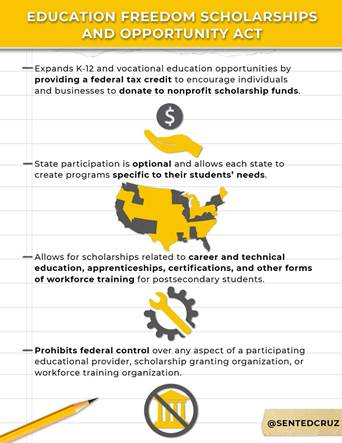Kicks off ‘Education Opportunity Tour’ with stops in Houston and Fort Bend County
ROSENBERG, Texas – U.S. Sen. Ted Cruz (R-Texas) today kicked off his ‘Education Opportunity Tour,’ of Texas schools, workplaces, and college campuses with a tour of an Associated Builders and Contractors (ABC) construction site and visit to Texas State Technical College Fort Bend County. In February, Sen. Cruz introduced the Education Freedom Scholarships and Opportunity Act, a bill that would expand elementary, secondary, and vocational education opportunities for students by providing a federal tax credit to encourage individuals and businesses to donate to nonprofit scholarship funds.
During his tour of the construction site, he spoke with construction workers and members of ABC, including Chairman of the Board of Directors of ABC Houston, Brandon Mabile, about the importance and value of workforce training.
“We need a strong, educated future workforce, and the way to do that – my legislation is $10 billion a year, $100 billion over 10 years to expand educational choice. Both for K-12 education, tax credits for scholarship-granting organizations so that kids can have choices, scholarships, and better options. When you look at our workforce, [in] Texas, we’ve got 1000 people a day moving to this state. I am here touring this construction site. When you look at construction, […] electricians, or plumbers, or guys putting up drywall, there is a shortage of skilled workers. There are a lot of people in Texas and across the country that need those skills. These are tax credits for scholarships to get the training, get apprenticeship, and get the skills so that people can go and build a career and provide for their families.”
Still photos and video of Sen. Cruz’s visit with ABC may be viewed here.
Later, he traveled to Fort Bend County for a tour of Texas State Technical College’s campus, where he visited with college students and hosted a roundtable with students and faculty.
“I’ve spent the afternoon here touring Texas State Technical College, which is doing a terrific job training young men and young women giving them critical skills for futures and for careers,” Sen. Cruz said. “I am a big fan of technical training. If you look at our workforce, Texas, the economy is booming. We have jobs across the state. And there’s a need all across Texas for skilled workers. Skilled workers who can go and make a difference in the industry right now.”
Still photos and video of Sen. Cruz’s tour and roundtable at Texas State Technical College may be viewed here.
Key provisions of the Education Freedom Scholarships and Opportunity Act include:
- Optional for States: State participation is optional – an issue important to prevent extending federal control over education.
- State Directed: States maintain the authority to create a program that works for them. States can decide which students are eligible for the scholarship credit, what constitutes eligible educational expenses and eligible educational providers, and more.
- Encourages Workplace Training Education: There is more than one pathway to success, and our rapidly-changing 21st century economy means that workers need new skills to compete. In addition to elementary and secondary education scholarships, this bill allows for scholarships related to career and technical education, apprenticeships, certifications, and other forms of workforce training for postsecondary students.
- Prohibits Federal Control of Education: Clarifies that nothing in this act shall be construed to permit, allow, encourage, or authorize any increased regulation or control over any aspect of a participating educational provider, scholarship granting organization, or workforce training organization. This allows all education providers to be able to participate, without fear of federal control.
- Helps Our Most Vulnerable Students: Many low- and middle-income students cannot afford tuition and educational expenses themselves, or do not have the means to pay for the workforce training needed to secure a stable, high-paying job. This tax credit will provide scholarships for these students, so that they can have the opportunity to receive an effective and successful education that prepares them for the future.




